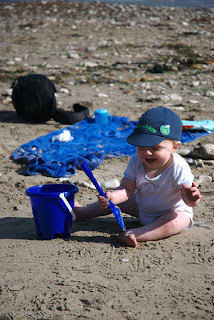 When we first went out in the Beetle, I realised to my horror that people noticed the car. I hadn’t really considered this beforehand; I know it’s a funky little car, but I didn’t think it was particularly noticeable. But actually we've not passed another one on the road in six weeks. And alas, people look. My heart sank.
When we first went out in the Beetle, I realised to my horror that people noticed the car. I hadn’t really considered this beforehand; I know it’s a funky little car, but I didn’t think it was particularly noticeable. But actually we've not passed another one on the road in six weeks. And alas, people look. My heart sank.I have quite enough of being noticed, thank you. No, please don't look over here.
People do notice me when I am out and about. The shape of my presence is different; I am going to catch your eye. Not your problem. I get so used to being noticed because of the wheelchair that whenever people look at me, it feels like it is because of that. Even when I'm not using the wheelchair.
 But then I realised something else about the Beetle. People notice the car. People look at the car. And then, almost every time, people smile at the car. They smile! Almost every time!
But then I realised something else about the Beetle. People notice the car. People look at the car. And then, almost every time, people smile at the car. They smile! Almost every time!What a funky little car, I suppose they must be thinking. It is uncomplicated, whatever it is. Unlike me.
People don't automatically respond to me with a smile.
Naturally, I get more smiles if I smile a lot myself. And I do smile a lot because that's what you do when you meet someone's eyes. And I like being smiled at. Do you get the feeling I'm not about to break into a bad poem about smiling? Not worth applying my skills to; smiling has already inspired a wealth of fantastically bad poems, and every one of them rhymning smile with while.
 But I really do appreciate it.
But I really do appreciate it.Smiling is never patronising. You might be smiling at the poor pathetic wheelchair woman as you might smile at a child, but I'm not to know that. You’re already looking at me, for crying out loud, what else are you going to do? Stare at me? Avert your gaze in embarrassment?
The latter is a very common and upsetting response. Because it doesn’t feel to me like you merely found yourself looking and didn’t want to be rude. It feels like you are embarrassed by the very sight of me. Like you are blanking me out because my appearance makes you uncomfortable. It looks like disgust. Which perhaps it is.
 Just a few of these and I get a tight knot just under my ribs. I get pissed off. Unreasonably, deeply pissed off. I start speaking your thoughts out loud; "How embarrassing!" I declare, to make you all the more so.
Just a few of these and I get a tight knot just under my ribs. I get pissed off. Unreasonably, deeply pissed off. I start speaking your thoughts out loud; "How embarrassing!" I declare, to make you all the more so.No, that's not nice. It isn't fair either. The mistake is a split-second barely-conscious decision, and I must have done it myself. I try not to. I try to look every charity collector or homeless person in the eye and smile, even when I have nothing to give them, even when it often means saying as much out loud, which is embarrassing.
But a smile, even from a stranger, can untangle that knot completely; Alka-Seltzer for the soul. It is that powerful, a physical relief, especially when on those days when the world seems full of scowlers and starers. Staring is less troublesome, because I convince myself that nobody ever knows they're doing it. It looks like you are just staring into space and I happen to occupy that space. Because nobody could possibly be that rude, could they?
 So anyway, it's a novelty to be noticed in an uncomplicated way. And I love riding in the Beetle for its effect on people. Whenever we are the first in the queue at a level crossing (which we are, very often; we have to cross the track between Norwich and Cambridge to get anywhere), I sit and wave at the train. I reckon I can get six or seven smiles for every carriage that passes.
So anyway, it's a novelty to be noticed in an uncomplicated way. And I love riding in the Beetle for its effect on people. Whenever we are the first in the queue at a level crossing (which we are, very often; we have to cross the track between Norwich and Cambridge to get anywhere), I sit and wave at the train. I reckon I can get six or seven smiles for every carriage that passes.And last week, I was sat in a carpark in Thetford and a small group of passing Portuguese school children broke into song about the Beetle; something about a buggy bug. Now that's a novelty indeed.


















